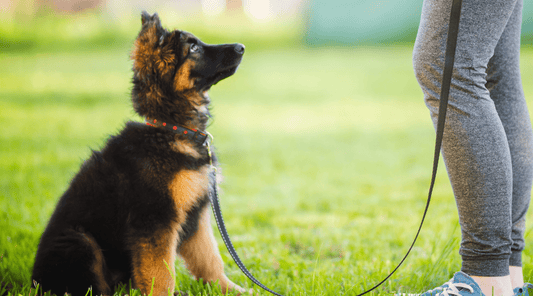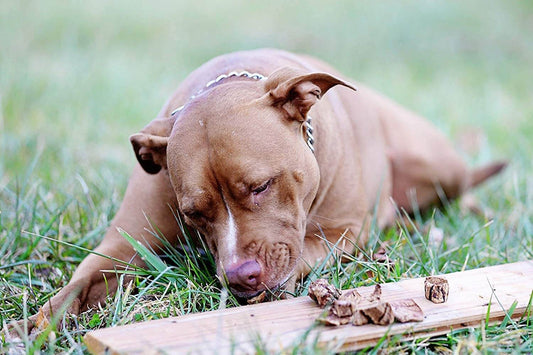Can Dogs Eat Real Bones? Training Class Debate Turns Quickly
Dawn Miller Aug 23, 20245 Minute ReadMy dog Pixie is a rambunctious little terrier. She's nonstop energy. So, when I found out one of the local dog training schools was hosting classes to benefit our favorite local pet shelter, Pixie and I were all in. I'll be honest: I went in thinking I already knew everything about dog training. But we learned so much! Like the importance of low-key praise to avoid overexciting a distractible pup like Pixie and choosing the right treats for training.
A curious conversation emerged during a break, and everyone took sides. When asked: Can dogs eat real bones? Some insisted you should never, ever give your dog real dog bones. Others said they do it all the time and that real bones are great for their dogs' health and happiness.
I think you know which camp I was in. Hint: Team Real Bones.
But I was honestly proud of us for having a civil conversation about a topic that hits so close to home. We all love our dogs more than anything. I wanted to share some of the conversation with names changed to protect the innocent.
Are Bones OK for Dogs?
Bones can be safe for dogs with a lot of benefits for physical, mental, and dental health. But it depends on the type of bone, size, and how it's prepared. I'd also argue that where it's sourced from matters too! I need to trust my dog bone supplier to give my dog a dog bone that has no fillers. It's all-natural with just one ingredient—the dog bone.
Now, back to our training day debate. One of the dog's humans, who I'll call Hannah, said her main concern with real bones for dogs was that they might splinter. A splintered bone could cause choking and injure the digestive tract as it passes through. It might even require surgery. That's not a concern I would take lightly as an animal lover.
I acknowledged her worry and shared how important type, size, and preparation are to make bones safe for dogs.
Type
The bone needs to have the right density, even for aggressive chewers. Chicken, turkey, and small animals are out. Their bones are not dense. On the other hand, beef bones have the right strength. Not too hard or too soft.
Size
Your dog shouldn't be able to get their whole mouth around the bone. They should be able to put a paw on the bone to hold it down while they gnaw. Beef dog bones are the perfect size for any size dog. You can find the meaty mammoth bones. I was surprised at how big these are. My large, aggressive chewer, Bruno, gets long-lasting chew time out of them.
But some beef bones are smaller, like beef knuckles or kneecaps. You can see the ones Pixie loves here.
Preparation
You should never give your dog bones from the dinner table. This is probably where the myth about the dog bone came from. Dinner bones have been cooked for too long and at too high a temperature. This makes them more likely to splinter.
Another dog dad, who I'll call Steve, said he thinks real bones for dogs are ok but never cooked bones. He gives his dog raw bones. He is absolutely right about some cooked bones, including those you have after you make real beef bone broth. But again, this comes down to preparation.
I trust my dog bone vendor. They use a slow, low-temperature method that brings out the meaty flavor while retaining nutrients and bone density.
What Kind of Real Bones Can Dogs Eat?
Cooked is best when cooked with a safety-first attitude. I personally don't like to give my dogs raw bones because I wouldn't want my dog running around my house and licking my face after eating a raw steak.
I have the same concern with raw beef bones like potentially dangerous pathogens. Besides, the AVMA (American Veterinary Medical Association) discourages giving dogs raw food because of risks to dog and human health.
Are Real Bones Good for Dogs?
Real bones for dogs have a lot of benefits. In the wild, dogs chew on bones because they recognize how important dog bones are to their health. Actually, dogs probably don't know why they love dog bones. As smart as my fur babies are, they probably only know that dog bones taste good.
That's because it's an instinct they shouldn't deny: They chew marrow-filled bones to:
- Clean their teeth
- Strengthen their jaw, which is important for posture and joint health
- Access the nutritional bone marrow
- Entertain themselves when bored
- Soothe fear or anxiety
Regardless of which side they were on, everyone agreed that dog bones do have these benefits. We just disagreed on the safest way to make sure our furry kids get those benefits. The "No Real Bones" side was adamant that dog bones made out of wood pulp or even rubber are better.
I respectfully disagreed, and here's what I told them.
Synthetic bones deliver some of the dental and mental health benefits, I guess, but they lack nutrition. Some manufacturers add artificial flavors and sugar to make up for the fact that they don't taste good.
I've never met a dog who wanted to chew on a plastic dog bone when they knew they could have a meaty real marrow bone instead. If I can ensure that bone is safe for them, that's what I'm going to give them instead of a fake bone.
What Nutrition Are Synthetic Bones Lacking?
Synthetic bones and wood pulp bones don't have any nutrition unless they're added to the dog bone artificially. There is a much better way to give dogs nutritional bones.
Give them real beef bones for dogs. Real beef marrow bones have:
- Collagen is the protein that provides structure to skin, hair, joints, and the digestive tract lining. Marrow bones are 30% pure protein.
- Healthy fats include omega-3 and conjugated linoleic acid (CLA). Both of these are well-studied for their anti-inflammatory properties. And grass-fed beef bones have even more essential fats with less saturated fat.
- Lots of vitamins like A and B12
- Lots of minerals like calcium, phosphorus and iron
Around my house, real dog bones are an essential part of complete dog nutrition. But they are treats, so I make sure my dogs get a balanced diet with mostly veterinarian-approved dog food.
What Bones Are Safe for Dogs?
Safe dog bones are real bones for dogs. They come from USA-raised, grass-fed cattle. They are cooked... but I make sure they are prepared to maximize safety and nutrition—but also taste. They shouldn't have to add artificial flavors and sugar to make the fake bone attractive to my dog.
Despite the general safety of these kinds of real bones for dogs, I always supervise chewing sessions. If the bone breaks, which is rare, I take it away. I give my dog beef lung bites as a trade to safely get it away from them.
Can dogs eat real bones? Are real bones good for dogs? Yes, they can eat real, all-natural bones. Chewing on dog bones is a natural behavior. It's healthy behavior when I make sure the bones I buy are safe.
Available On:
Disclosure: This article may contain affiliate links, which means we may earn a small commission if you make a purchase through these links—at no extra cost to you. We only recommend products we trust and believe will benefit you and your K9.






